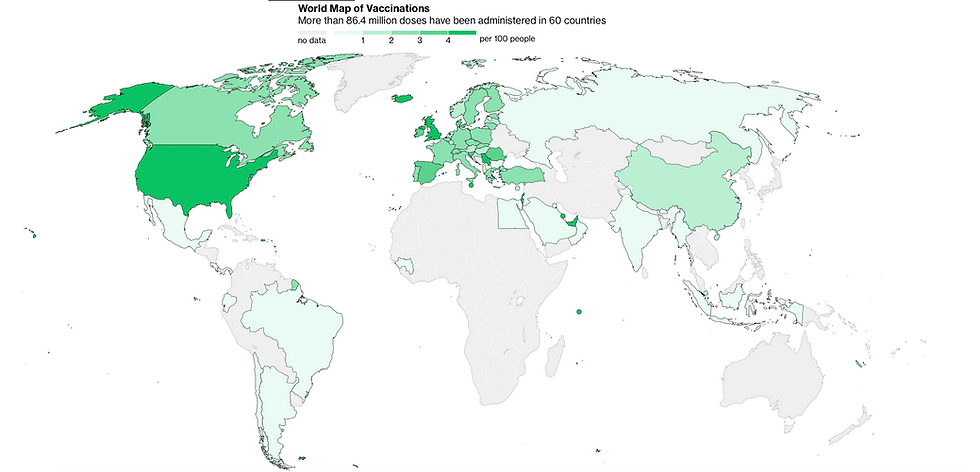Distribution of COVID-19 Vaccines to Poor Countries: Moral and Logistical Challenges
- Céline Hourcade
- Jan 29, 2021
- 3 min read
Back in 2020, as vaccines against the coronavirus were being developed and tested in a speed never seen before, it quickly became clear that we would have a vaccine soon and need to prepare for its global distribution.
The moral question of equitable vaccine distribution
Then came the race for vaccine procurement. In most cases, for countries or organized international bodies like COVAX, procuring a certain number of yet-to-be confirmed and authorized vaccines meant taking bets and striking deals with multiple manufacturers. And those countries with stronger economic power were surely in a position to take more risks and book vaccines in higher volumes. Countries like Canada, United Kingdom and New Zealand procured way more vaccines than their population. In the meantime, the poorest countries mostly relied on COVAX initiative which aims to secure 2 billion vaccines by end of this year and distribute them equitably across the globe, covering up to 20% of country population:

Source: Duke Global Health Innovation Center. (2020). Launch and Scale Speedometer. Duke University.
Now that 11 vaccines are approved in at least 1 country, the production and logistics are in full swing, with ever-increasing pressure from the media, the public and the health sector to speed it up and tackle all delays and challenges fast. Pressure at national level leaves very little opportunity to focus on the global picture and ensure the equal access to the vaccine for all:

Source: Bloomberg
The scarce coverage on how dramatically bad the situation is in the poorer world shows everyone is fending for themselves. While wealthy nations with a strong negotiation power have prioritized vaccine distribution to their own populations, some of the poor nations have been receiving vaccines in as low as 25 doses. In the meantime, when challenged, the rich countries keep on pointing to the hundreds of millions of dollars they have attributed to support the vaccination of the poor world and prefer to focus on their national interests rather than a concerted global approach. This alarming situation is not only a potentially extreme moral failure, but also a serious miscalculation, as without a global immunity the pandemic restrictions will be prolonged with continuous social, cultural and economic losses worldwide.
“This alarming situation is not only a potentially extreme moral failure, but also a serious miscalculation, as without a global immunity the pandemic restrictions will be prolonged with continuous social, cultural and economic losses worldwide.”
At the online event Davos Agenda 2021, the CEO of Gavi, the Vaccine Alliance, Seth F. Berkley, also coordinating the work of COVAX work, was confident 1.5 billion vaccines will be distributed globally by the end of the year and the coalition is working hard to procure more vaccines for the developing world from the countries with surplus vaccine orders.
The practical challenges of vaccine transportation and distribution
Logistics of COVID-19 vaccines is already a big challenge in developed countries with existing infrastructure, especially to reach the last mile and the arms of the patients safely, while ensuring maximum security and protecting the products from temperature deviations.
In addition to these “classic” logistics challenges the pharma industry deals with, supply chain professionals need to transport, handle and deliver the vaccines taking into account special restrictions due to the pandemic: night curfews slowing down processes, quarantine measures affecting pilots and drivers crossing borders, health and safety protocols affecting frontline workers, etc.
It is foreseeable that poorer nations will face even greater challenges: a large majority of the developing world, including Africa, Latin America and Southeast Asia countries, has limited transport connectivity and inadequate infrastructure at airports and on the ground, extreme weather conditions and limited logistics capabilities, including cold chain vehicles, equipment and storage facilities.
Storing and transporting large amounts of Pfizer or Moderna vaccines both of which require deep frozen conditions and special containers are practically impossible in the developing world without facing a risk of breaking the cold chain. Combined with a much higher price, the poorer countries and COVAX have placed their bets on more traditional vaccines still in trials, including the one of the Oxford-AstraZeneca which not only can be transported and stored using the existing logistics infrastructure but is also cheaper. The issue is that the trial period and approval have been taking much longer than expected, leaving those waiting in higher risk of being left out at the far end of the global immunization race.
The time to act is now
One thing is clear, no one will be safe until the whole world combats this pandemic. It is clearly disturbing to see richer countries hoarding vaccines, the same ones who called for social and racial justice just last year. And the same ones that have been bailing out their travel sector eagerly waiting for restrictions to be lifted to reconnect the world once again.
So, what can be done collectively to ensure safe and equitable distribution of vaccines across the globe to ensure rapid loosening of restrictions, opening of the borders and the restart of the economies?




Comments